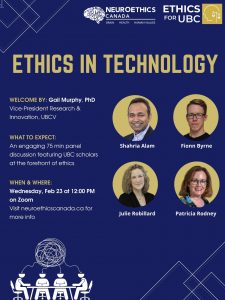
Ethics in Technology was the second installation of Ethics for UBC, a five-part speaker series that explores the current landscape of ethics scholarship and education across the Vancouver and Okanagan campuses of our university.
This panel discussion focused on ethics across a variety of disciplines that involve technology, from engineering and architecture to neuroscience and nursing.
Date: February 23, 2022
Time: 12:00 PM – 1:15 PM PST
Via Zoom
For more information about the other Ethics for UBC sessions, please visit: https://neuroethics.med.ubc.ca/ethics-for-ubc/.
Welcome by: Gail Murphy, PhD; Professor, Computer Science; Vice President – Research and Innovation, University of British Columbia
Moderated by: Ari Rotenberg, BA; MSc Candidate, Experimental Medicine; Neuroethics Canada, University of British Columbia
Panelists:
- Shahria Alam, PhD; Professor, School of Engineering; Director, Green Construction Research Training Centre, University of British Columbia – Okanagan Campus
- Fionn Byrne, MLA; Assistant Professor, School of Architecture and Landscape Architecture, University of British Columbia
- Julie Robillard, PhD; Assistant Professor of Neurology, Faculty of Medicine; Faculty, Neuroethics Canada, University of British Columbia
- Patricia Rodney, PhD; Associate Professor Emerita, School of Nursing, University of British Columbia
Break-out Sessions Highlights:
Break-out session with Dr. Shahria Alam:
-
-
- Key ethical issues in civil engineering have changed over time as the regulations that govern engineering practice in British Columbia have changed.
- Academia is a more conducive space for advancing innovation in sustainable building technologies than industry.
-
Break-out session with Prof. Fionn Byrne:
-
-
- Landscape architects are committed to environmental betterment, but untangling what “environmental betterment” looks like often depends on many contextual factors.
- Value of acknowledging ongoing debates and conflicting opinions of land use and weighing the pros and cons of potential actions.
-
Break-out session with Dr. Julie Robillard:
-
-
- Social technologies have dramatically changed the ways in which we communicate.
- Clinicians are apprehensive about the integration of AI-based medical technology into the patient care continuum; continued, collaborative efforts are required to adapt regulatory frameworks around these devices.
-
Break-out session with Dr. Patricia Rodney:
-
-
- Value of bringing an interdisciplinary approach to tackling complex questions in ethics.
- Importance of empathetic acknowledgement, trust-building, and understanding family dynamics and challenges faced by patients before negotiating a way forward in end-of-life decision-making.
-
Recommended Resource Materials: